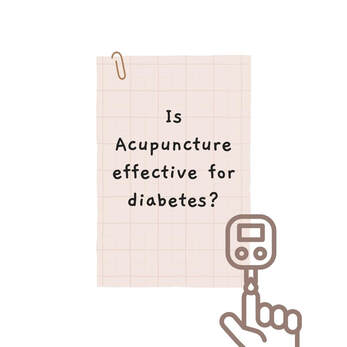 Diabetes is one of the most prevalent chronic diseases in the US and cases are rising at an alarming rate. As of 2020, over 10% of the U.S. population have diabetes (this is up from about 6% in 2000 , and prevalence is also expected to double in the next 20 years). 95% of those cases are type 2. Because of this, a lot of the conversation around diabetes as a chronic health issue is referring to type 2 diabetes and it’s defining culprit: insulin resistance. Insulin resistance can be understood as the ineffective use of insulin in the body leading to poor control of blood sugar and is usually associated with excess body weight. Until recently it was generally only seen in adults, but more and more children are diagnosed every day due to poor diet and inactivity. This metabolic syndrome can lead to vascular issues, neuropathy, and kidney problems. In fact, diabetes type 2 is associated with a 2 to 3-fold risk of heart attacks and stroke. Other complications include blindness and lower limb amputation. In 2019, it was the 9th leading cause of death with 1.5 million deaths directly caused by diabetes. Modern approaches are mainly drug-based though any successful management program will include diet and lifestyle changes. Metformin is the drug of choice for most as it reduces the amount of sugar the liver releases into your blood, while also helping the body to respond better to insulin (the hormone responsible for bringing sugar into the cell and out of the blood). A1C is the typical blood-test used to gauge a person's average blood sugar and treatment progress. Currently, with western treatment, only about 50% of people reach their A1C target , which clearly leaves some room for improvement and alternative therapies. So, what about acupuncture? There is definitely a need for more research and prospective studies are continuously designed and await funding, but so far the established research is very promising. In a 2018 study of 90 rats, it was found that within 3 weeks, diabetic rats that received electroacupuncture at specific acupuncture points had lower glucose levels, increased insulin levels and improved glucose tolerance. Acupuncture also shows significant benefit as an adjunctive therapy to pharmaceutical treatment. In 2015, an article published in Acupuncture in Medicine reviewed studies using rats in which scientists combined electroacupuncture with metformin. It was found that the combination of metformin and acupuncture offered better glucose lowering effects and greater insulin sensitivity when compared with metformin alone. Acupuncture has also been shown to assist in weight loss while reducing blood sugar levels in type 2 diabetes patients. Sanming County Hospital of Integrated Medicine researchers (Fujian) conducted a clinical trial of obese patients diagnosed with type 2 diabetes. A group receiving “routine care” (metformin plus lifestyle guidance) was compared with another group receiving routine care plus regular acupuncture. Although weight loss was statistically significant for both groups, reductions were significantly greater in the acupuncture group as measured by BMI (Body Mass Index). One of the top complaints doctors and acupuncturists alike hear from patients with diabetes type 2 is neuropathy (weakness, numbness and pain, usually in the hands and feet). This is because, over time, uncontrolled blood sugar damages the nerves. Studies also show that acupuncture can be very effective in easing the suffering from such complications. In a review of 13 random controlled trials looking at acupuncture and various types of neuropathy, the majority showed benefit in the treatment of diabetic neuropathy. Acupuncture takes the approach of bringing the individual body back into balance with itself and the environment, so each person’s treatment will be based on a customized plan. TCM (Traditional Chinese Medicine) offers personalized diet and lifestyle guidance towards this aim as well. Given the growing prevalence of this metabolic disorder and the limitations of modern treatment, acupuncture should be a consideration for anyone concerned with prevention and/or treatment of this disease. Acupuncture is a cost-effective way to support the body’s metabolism whether or not diabetes is a concern. Call today to set yourself up with some energy-boosting treatments that can help to regulate hormones and strengthen digestive function! 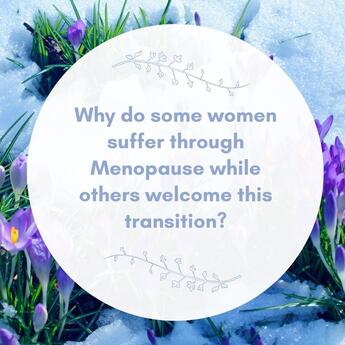 Menopause, for some women, is a welcome transition to the post-reproductive phase of one’s life. However, it has gotten a bad rap due to the symptoms many women experience while their bodies adjust to the changes. From a Chinese Medicine perspective, it is the inability of the body to adjust it’s energies gracefully to this new phase that causes symptoms, not the menopause itself. A gradual transition over time in a healthy individual will be less likely to induce the struggles commonly associated with menopause such as hot flashes, weight gain, dryness, sleep problems and mood swings. (Irregular periods, while inconvenient, are not necessarily considered a problem in this view, but par for the course of change leading up to true menopause). Menopause is medically defined as the absence of a period for 1 year. Up until that point, the changes are considered peri-menopause: a slowing down of the reproductive faculties of the body. The struggles mentioned above can begin during peri-menopause, as early as a women’s 40’s and can last into her late 50s. During this time, the ovaries start making less estrogen and progesterone (the hormones that regulate menstruation). These hormonal changes are the reason for the hot flashes that tend to be the main complaint of women approaching menopause. The hot flashes in turn can disrupt sleep, leading to further imbalances and mood swings. The hormones also affect the metabolism, which can lead to weight gain and body changes. Vaginal dryness is also related to the declining hormones. In simplistic terms, these hormonal changes can be seen in TCM as a decline in yin, leading to a yin-yang imbalance. Yin refers to the cooling, calming, moisturizing influences of the body, and when deficient can lead to heat, dryness and nervousness or irritability. Acupuncture (and TCM lifestyle guidance) can help to re-calibrate the yin-yang balance to ease this transition. A year-long NCCIH-funded study involved 209 peri-menopausal & menopausal women age 45–60 who had at least four hot flashes per day. Researchers found that acupuncture significantly reduced symptoms of hot flashes, anxiety, sleep issues and memory loss by as much as 36.7 %. The improvements persisted at least 6 months after treatment. Another study compared menopausal symptoms of 70 women, after half of them had 6 weeks of regular acupuncture. In the acupuncture group there were clinically significant improvements in occurrence of hot flashes, night sweats, and other physical and emotional symptoms. And even for women who are abruptly pushed into menopause, such as after a hysterectomy or ovariectomy, whose symptoms tend to be more severe, acupuncture (along with ear-acupuncture!) has been shown to reduce their (generally more intense) hot flashes as well. Hormone Replacement Therapy (HRT) is the western medical approach to menopause for severe symptoms brought on by hormonal changes, but comes with serious risks and is not for everyone. Acupuncture has the power to rebalance the body’s energies when life transitions challenge our stability and is a great alternative or complementary therapy for any woman entering this new phase of life. The shift into menopause can be much smoother with a little assistance from your local acupuncturist, but don’t wait until symptoms are severe. Call today to bring more balance into your personal journey! 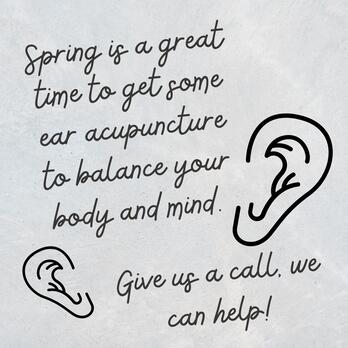 The Vagus nerve has achieved near rockstar notoriety in the world of health these days, while having nothing to do with a certain high energy city in Nevada. Though you may need your vagus nerve stimulated after a few days in the discordant noises and flashing lights of Las Vegas. When you think of the Vagus nerve, think relaxation. The Vagus (latin for wandering) nerve is the longest of the cranial nerves and the main nerve of the parasympathetic nervous system. The parasympathetic nervous system activates our “rest and digest” functions to counterbalance the “fight or flight” mode of the sympathetic nervous system. It originates in the brainstem and travels to innervate the heart, lung, stomach, pancreas, liver, small intestines, and half of the large intestines. It helps to regulate heart rate, respiration and digestion and is considered the main communication route responsible for the famous gut-brain axis. Recent research has added to the exciting promise it holds for health and wellness as Vagus Nerve Stimulation (VNS) has been shown to inhibit oxidative stress and reduce inflammation. Clinical trials focused on VNS have shown benefit in the treatment of inflammatory conditions such as Crohn's disease and Rheumatoid arthritis. Additional benefits are seen in the frontal lobe activation that vagal stimulation can influence. Frontal brain activity is associated with better decision making and healthier lifestyle choices which correspond with a general reduction in disease. Basically, when we are relaxed, we can think better. It makes sense then that greater Heart Rate Variability (HRV), a health measure directly linked to VNS, predicts better health outcomes. So where does Acupuncture come in? Well you guessed it: one of the ways acupuncture works it’s magic is by stimulating the vagus nerve. Harvard researchers have found that acupuncture stimulates the vagal-adrenal axis and can alleviate systemic inflammation by calming cytokine storms (excessive immune reactions). This mechanism can help explain some of the extensive benefits of acupuncture such as it’s success in treating various inflammatory, immune and nervous disorders as well as it’s general ability to help bring the body back into homeostasis. Auricular (ear) acupuncture is an area of focus for the growing interest in VNS. When that long nerve leaves the brain stem, a branch travels up into the ear, giving us more direct external access to the internal workings of this nerve. Both ear acupuncture and ear acupressure have both shown to elicit vagal tone There have also been recent developments specifically for the ear: non-invasive VNS devices that attach to the ear and can be self-administered at home. These increase the relaxation response, and can be used for issues like anxiety and various inflammatory issues. In our increasingly busy (yang) world, it is important to slow down, take some deep breaths and access the power of the vagus nerve (yin) to calm your system and regain a sense of balance. In a pinch, try massaging your ears, and while you’re at it be sure to schedule your next acupuncture appointment so you can experience the full benefits of VNS! 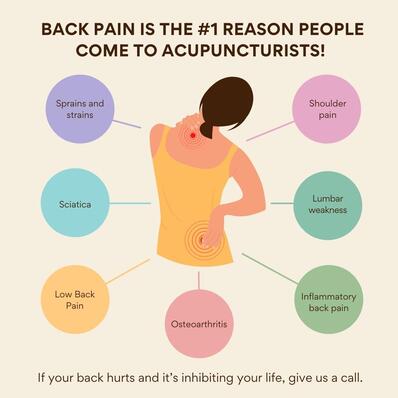 When acupuncturists treat back pain in Chinese Medicine we often focus on 2 aspects of Traditional Chinese Medicine(TCM): the Kidney system and the concept of ‘qi (energy) & Blood Stagnation’. The low back is the ‘mansion of the kidneys’ and relies on good stores of kidney qi for proper function while qi & blood stagnation is a major contributor to low back pain. Qi and blood stagnation can be due to external factors such as pathogens or trauma, or internal weakness of qi and blood flow related to diet and lifestyle. Many of the bad habits we develop that can induce back pain are repeated poor choices in our everyday lives that cause qi and blood stagnation and/or tax our kidney system. Let’s look at some of the common problem areas:
For additional assistance in changing unhealthy behaviors, moving qi and blood stagnation and supporting your kidneys for back pain relief and better overall health, get in for some re-balancing acupuncture treatments! 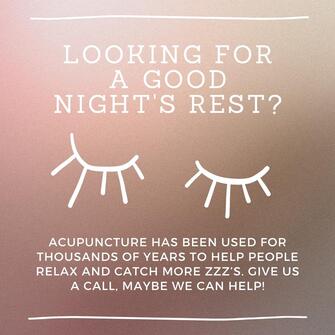 Nearly 30% of American adults struggle with chronic insomnia, and that percentage increases with age. Standard treatment includes sleeping pills and cognitive therapy. Cognitive therapy shows a lot of promise as an effective treatment and sleeping pills, though presenting some risks, can be helpful for the short-term. It is a condition, however, according to standard approaches, that can be treated, but unfortunately, not cured. And while many Americans don't meet the criteria of a ‘chronic insomnia’ label, anyone who lacks proper sleep on a regular basis will eventually suffer physical, mental and emotional health consequences. Besides the obvious fatigue that comes along with many types of insomnia, there can be accompanying effects such as headaches, dizziness, and sore muscles as well as mood issues. One large study found that those with insomnia were five times more likely to suffer from depression than those who got adequate sleep. This is in addition to other associated effects on brain health, cardiovascular health, immunity and weight. Acupuncturists typically always ask about quantity and quality of sleep no matter the initial complaint or reason for seeking treatment. This is because as holistic health practitioners, we recognize the enormous impact sleep has on the overall health experience. If there are any deficits when it comes to sleep, this will usually be part of the focus for treatment. In Traditional Chinese Medicine (TCM), night time is yin time, a time for rest, healing and recovery. It needs to be in balance with yang time (daytime) activity levels. This harmony of yin and yang is central to the TCM understanding of health. Acupuncture takes an individualized approach to insomnia, as everyone is different, and there can be many reasons why someone is out of balance. In addition to external factors such as trauma or stress, a person’s internal environment will be looked at. A pattern assessment is done to evaluate both the abundance and flow of blood and energy (qi) in the body, excess hot or cold type disorders and any organ imbalances. But is it effective? In a review of random controlled trials evaluating the effectiveness of acupuncture for insomnia, acupuncture was found superior to medications in its ability to increase sleep duration for >3 hours. Also, acupuncture plus medications showed better effect than medications alone on total sleep duration. And finally, acupuncture plus herbs was significantly better than herbs alone on increase of sleep rates. Worthwhile to note that there were no serious adverse effects of acupuncture observed in any of the trials. According to Western physiology, acupuncture affects our ability to sleep by triggering the release of our sleep hormone: melatonin, and various other mechanisms still being studied, such as the activation of specific brain pathways involved in sensory processing . Acupuncture is also known to stimulate the vagus nerve, which helps shift the whole body into a more relaxed state. When the body goes into this relaxed state, not only does sleep quality improve, the body also turns on the immune and repair systems, cutting down oxidative stress and inflammation in the body. Given the interrelationship of sleep and overall health, if all acupuncture did was improve sleep, it would still merit recognition as a valuable health system. But Acupuncture is prescribed for so much more! Call today to set up a sleep and overall health improving series of treatments and start feeling the benefits right away! |
AuthorsRebecca M H Kitzerow is a Licensed Acupuncturist practicing in La Center, Washington. With over a decade of experience she has won 10 Nattie consumer choice awards from Natural Awakenings Magazine since 2014. Archives
July 2024
Categories
All
|
Photos from Hey Paul Studios, BeGreen_Studio, Pawel Pacholec, 1950sUnlimited, toulupaliaqaz, Joelk75, OnTask, Robert Gourley, cnu_sports, Mitya Ku, wuestenigel (CC BY 2.0), FootMassagez, 401(K) 2013, Mariana Heinz, @EdwardTerry, fishhawk, liverpoolhls, torbakhopper, Boemski, dolomitibl, Driscolltheque, Dave n Laura, Vaping360, MVWorks, Life Mental Health, MVWorks, mikefats, Scot Nelson, jfl1066, wZa HK, ruurmo, Guadalupe Cervilla, Army Medicine, GViciano, torbakhopper, adrigu, Saulo Cruz, Ben Cumming, marniejoyce, kcxd, JasonCorey, kanenas.net, Live to Create Photography, gm.esthermax, Unique Hotels Group, Zenspa1, mysiana, Tobias Lindman, Leader Nancy Pelosi, Kristoffer Trolle, swanksalot, Bill Selak, Parker Knight, stimpsonjake, Gedankensprudler, SuperFantastic, tonynetone, marniejoyce, JeepersMedia, Illusive Photography, 'Ajnagraphy', Iban Torras, scotted400, gtall1, dvanzuijlekom, BPPrice, Skley, torbakhopper, Renato Ganoza, anka.albrecht, QUOI Media, Public Domain Photos, Instant Vantage, Victor Tongdee, Free Grunge Textures - www.freestock.ca, sportEX journals, Nadja Tatar, angela n., marniejoyce, MVWorks, Karolina Kabat, Thomas Fisher Rare Book Library, UofT, ginnerobot, tracilawson, haven't the slightest, My Photo Journeys, Pierre Willemin, Florena_Presse, SuperFantastic, colindunn, zzkt, TraumaAndDissociation, ER24 EMS (Pty) Ltd., shixart1985 (CC BY 2.0), marniejoyce, Tomás Fano, freestock.ca ♡ dare to share beauty, Archives New Zealand, Jaykhuang, airdrie.m, Go-tea 郭天, OnTask, wuestenigel, focusonmore.com, Disney | ABC Television Group, Andrew Gustar, Didriks, ConstructionDealMkting, charlywkarl, barnimages.com, Lel4nd, runwaypilates, michaelstephanfotografie, McLevn, TraumaAndDissociation, eLife - the journal, Lars Plougmann, wuestenigel, shixart1985, boviate, davis.steve32, kevin dooley, @the.photoguy (insta), frederic.gombert, Feathering the Nest, Victor Tondee, shixart1985, wuestenigel, Joe K Gage, kennethkonica
 RSS Feed
RSS Feed
